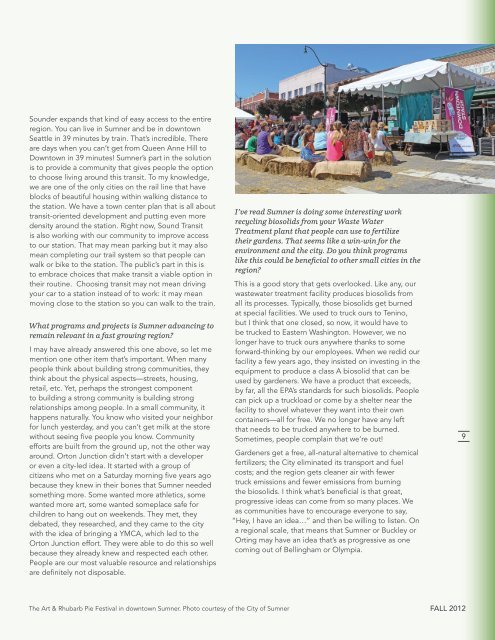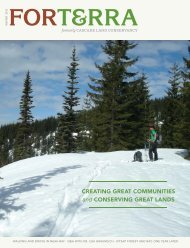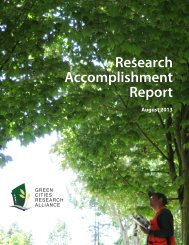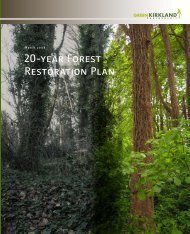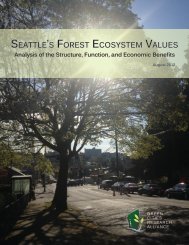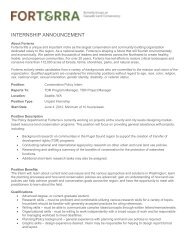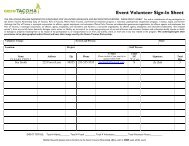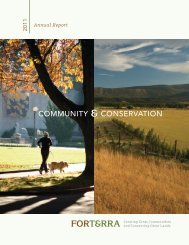Download - Cascade Land Conservancy
Download - Cascade Land Conservancy
Download - Cascade Land Conservancy
You also want an ePaper? Increase the reach of your titles
YUMPU automatically turns print PDFs into web optimized ePapers that Google loves.
Sounder expands that kind of easy access to the entire<br />
region. You can live in Sumner and be in downtown<br />
Seattle in 39 minutes by train. That’s incredible. There<br />
are days when you can’t get from Queen Anne Hill to<br />
Downtown in 39 minutes! Sumner’s part in the solution<br />
is to provide a community that gives people the option<br />
to choose living around this transit. To my knowledge,<br />
we are one of the only cities on the rail line that have<br />
blocks of beautiful housing within walking distance to<br />
the station. We have a town center plan that is all about<br />
transit-oriented development and putting even more<br />
density around the station. Right now, Sound Transit<br />
is also working with our community to improve access<br />
to our station. That may mean parking but it may also<br />
mean completing our trail system so that people can<br />
walk or bike to the station. The public’s part in this is<br />
to embrace choices that make transit a viable option in<br />
their routine. Choosing transit may not mean driving<br />
your car to a station instead of to work: it may mean<br />
moving close to the station so you can walk to the train.<br />
What programs and projects is Sumner advancing to<br />
remain relevant in a fast growing region?<br />
I may have already answered this one above, so let me<br />
mention one other item that’s important. When many<br />
people think about building strong communities, they<br />
think about the physical aspects—streets, housing,<br />
retail, etc. Yet, perhaps the strongest component<br />
to building a strong community is building strong<br />
relationships among people. In a small community, it<br />
happens naturally. You know who visited your neighbor<br />
for lunch yesterday, and you can’t get milk at the store<br />
without seeing five people you know. Community<br />
efforts are built from the ground up, not the other way<br />
around. Orton Junction didn’t start with a developer<br />
or even a city-led idea. It started with a group of<br />
citizens who met on a Saturday morning five years ago<br />
because they knew in their bones that Sumner needed<br />
something more. Some wanted more athletics, some<br />
wanted more art, some wanted someplace safe for<br />
children to hang out on weekends. They met, they<br />
debated, they researched, and they came to the city<br />
with the idea of bringing a YMCA, which led to the<br />
Orton Junction effort. They were able to do this so well<br />
because they already knew and respected each other.<br />
People are our most valuable resource and relationships<br />
are definitely not disposable.<br />
I’ve read Sumner is doing some interesting work<br />
recycling biosolids from your Waste Water<br />
Treatment plant that people can use to fertilize<br />
their gardens. That seems like a win-win for the<br />
environment and the city. Do you think programs<br />
like this could be beneficial to other small cities in the<br />
region?<br />
This is a good story that gets overlooked. Like any, our<br />
wastewater treatment facility produces biosolids from<br />
all its processes. Typically, those biosolids get burned<br />
at special facilities. We used to truck ours to Tenino,<br />
but I think that one closed, so now, it would have to<br />
be trucked to Eastern Washington. However, we no<br />
longer have to truck ours anywhere thanks to some<br />
forward-thinking by our employees. When we redid our<br />
facility a few years ago, they insisted on investing in the<br />
equipment to produce a class A biosolid that can be<br />
used by gardeners. We have a product that exceeds,<br />
by far, all the EPA’s standards for such biosolids. People<br />
can pick up a truckload or come by a shelter near the<br />
facility to shovel whatever they want into their own<br />
containers—all for free. We no longer have any left<br />
that needs to be trucked anywhere to be burned.<br />
Sometimes, people complain that we’re out!<br />
Gardeners get a free, all-natural alternative to chemical<br />
fertilizers; the City eliminated its transport and fuel<br />
costs; and the region gets cleaner air with fewer<br />
truck emissions and fewer emissions from burning<br />
the biosolids. I think what’s beneficial is that great,<br />
progressive ideas can come from so many places. We<br />
as communities have to encourage everyone to say,<br />
“Hey, I have an idea…” and then be willing to listen. On<br />
a regional scale, that means that Sumner or Buckley or<br />
Orting may have an idea that’s as progressive as one<br />
coming out of Bellingham or Olympia.<br />
9<br />
The Art & Rhubarb Pie Festival in downtown Sumner. Photo courtesy of the City of Sumner<br />
FALL 2012


